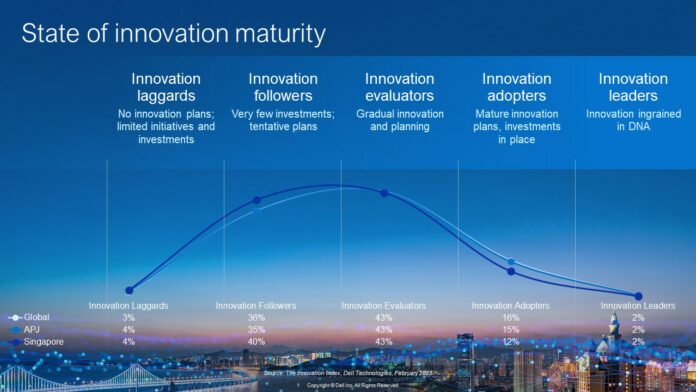Just about three in every five (62%) of firms in Singapore fear their organisation could be irrelevant in three to five years, based on the health of their innovation pipeline and culture, according to the Dell Technologies Innovation Index.
A new global study, polling 6,600 employees across more than 45 countries, illustrates why innovation is business critical and how organisations should harness their people, processes, and technologies to innovate effectively.
The Asia Pacific & Japan study polled 1,700 employees in Australia and New Zealand, India, Japan, Malaysia, Singapore, South Korea, and Thailand. In Singapore, 200 employees were surveyed.
Through assessing organisations, respondents are placed on an innovation maturity benchmark ranging from Innovation Leaders to Innovation Laggards. Only 13% of Singapore organisations can be defined as Innovation Leaders and Adopters.
These firms have an end-to-end innovation strategy and are well placed to navigate headwinds coming from a global recession, supply chain issues, environmental impacts and more, and continue to grow.
In Singapore, they are 1.3 times more likely to accelerate their innovation during a recession than Innovation Followers and Laggards who are more likely to decelerate.
This “innovation resilience” — determination and ability to innovate during tough times — is credited as part of the reason why Innovation Leaders and Adopters are 1.3 times more likely to experience high levels of revenue growth than Innovation Laggards and Followers.
Innovation Leaders and Adopters are also 1.08 times more likely to automate more to enable teams to innovate than Innovation Laggards and Followers.
According to Dell, organisations need help to develop an innovation culture where all ideas can make a difference and learning through failure is encouraged.
The study found that 59% of respondents believe people leave their company because they haven’t been able to innovate as much as they hoped they would.
Also, 63% say aspects of their company’s culture are holding them back from being as innovative as they want to be/can be.
Company culture is set and modelled by leadership but 72% say their leaders are more inclined to favor their own ideas. Some of the top cited personal barriers to innovation are a fear of failure and a lack of confidence to share ideas with leaders.
Similarly, the Innovation Index reveals that businesses are struggling to embed a structured, data-driven innovation process to realise innovation across the organisation.
Only 26% of IT Decision Makers say all their innovation efforts are based on data, and 51% aren’t aligning all innovation projects to company goals.
Findings point to the power of technology to enable innovation, and the consequences of falling behind.
The vast majority in Singapore – 88% – are actively seeking out technologies to help them realise their innovation goal. Conversely, 63% believe their technology is not cutting-edge and fear they will fall behind their competitors.
The study also explores where organisations are making gains and facing obstacles, across five technology catalysts for innovation — multicloud, edge, modern data infrastructure, anywhere-work, and cybersecurity. In nearly all areas, the greatest stumbling block to unlocking that potential is complexity.
For instance, too many organisations have arrived at a multicloud environment by happenstance — an amalgamation of cloud platforms, apps, tools etc. The complexity is costing organisations time, money and precious opportunities to innovate.
















